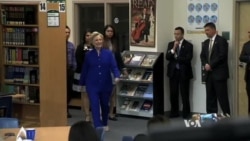It has been a challenging few months for Democratic presidential candidate Hillary Clinton, but the latest polls suggest she has weathered the storm for now, at least among Democrats.
Polls by the Wall Street Journal/NBC News and the New York Times/CBS News show that Clinton’s trustworthiness has taken a hit following the controversy over her use of a private email account as secretary of state and questions about the fundraising practices of the Clinton Foundation.
But the surveys also suggest that the controversies have not cost Clinton support among Democrats and she remains the prohibitive favorite for the Democratic Party nomination. Her only official challenger at the moment is Vermont independent Senator Bernie Sanders.
Clinton’s support among Democrats appears resilient, according to John Fortier, an analyst at the Bipartisan Policy Center in Washington.
“What she does run on is having great experience, great support from the party, great support from all of the leaders, all of the fundraisers and that is a very strong position to begin from,” he said.
Strong in Iowa
A new Quinnipiac poll of Iowa voters found Clinton way ahead with 60 percent support for next year’s first in the nation Iowa caucuses, with Sanders trailing behind at 15 percent.
“One thing is obvious about Iowa Democratic Caucus participants,” said Quinnipiac pollster Peter Brown. “They are as loyal as the day is long when it comes to Hillary Clinton.”
Brown said that so far the flaps over her use of private email and the Clinton Foundation fundraising issues have had “absolutely no effect on her standing among Iowa Democrats.”
But Fortier said that the questions surrounding the email controversy, the Clinton funding and the Benghazi terror attacks when she was secretary of state are not going away anytime soon.
“There are some questions about it and especially because it involves foreign governments, and some that really don’t look so good, I think that these questions will continue for a while,” he said.
Clinton also did well against the leading Republicans in the Journal/NBC News poll. She holds a six point lead over both former Florida governor Jeb Bush and Florida Senator Marco Rubio.
Rubio is officially in the race while Bush is expected to join soon. Clinton also has a 10-point lead over Wisconsin Governor Scott Walker, who has yet to announce, and only a three-point lead over Kentucky Senator Rand Paul, who has entered the race officially.
But even if Clinton winds up prevailing in the Democratic primaries, she could face some significant challenges in the general election because of her age and the fact she has been in the national spotlight now for more than 20 years.
"I think in some ways Hillary Clinton is going to be running against herself,” said analyst Charlie Cook of the Cook Political Report. “She has got to show herself relevant in the 21st century. She has got to be more future-oriented that past.”
Highlighting immigration divide
Clinton also sought to put her Republican rivals on the defensive this week during a campaign visit to Las Vegas and in a roundtable discussion on immigration.
She made it clear she wanted to go further than President Barack Obama in ensuring a path to citizenship for most of those who come into the country illegally.
“Make no mistake,” she said. “Today not a single Republican candidate, announced or potential, is clearly and consistently supporting a path to citizenship. Not one.”
The response from most Republican presidential contenders was muted.
Walker blasted the path to citizenship idea as amnesty. Walker said “a full embrace of amnesty” would be unfair to hard-working Americans.”
Clinton signaled she would shy away from putting pressure on Republicans to explain their stances on immigration.
Most of those who have announced or who are mulling a presidential bid support some version of allowing immigrants to apply for legal status but would prefer to secure the border first.
Immigration has been trump card for Democrats in presidential politics in recent years.
President Obama won 71 percent of Hispanic voters in his 2012 re-election victory and Republicans will face the challenge again in 2016 of primary debates that veer far to the right and limit their opportunities to make headway against the strong Latino support for Democrats.
The Republican field grew to a total of six announced candidates this past week with the addition of three candidates.
Retired neuro-surgeon Ben Carson became the first African-American to join the race and former Hewlett-Packard CEO Carly Fiorina became the first woman in the race for the Republican nomination.
Former Arkansas governor Mike Huckabee also announced he was making a second try for the White House after his failed campaign in 2008.
Among those expected to join the race soon are two Republicans at the top of national polls, former Florida governor Bush and Wisconsin Governor Walker.






